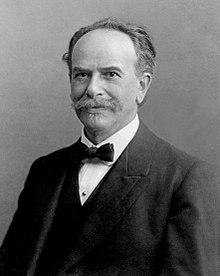Boasian anthropology
This article's lead section may be too short to adequately summarize the key points. (September 2024) |

Boasian anthropology was a school within American anthropology founded by Franz Boas in the late 19th century.
Overview
[edit]Boasian anthropology was based on the four-field model of anthropology uniting the fields of cultural anthropology, linguistic anthropology, physical anthropology, and archaeology under the umbrella of anthropology. It was based on an understanding of human cultures as malleable and perpetuated through social learning, and understood behavioral differences between peoples as largely separate from and unaffected by innate predispositions stemming from human biology—in this way it rejected the view that cultural differences were essentially biologically based. It also rejected ideas of cultural evolution which ranked societies and cultures according to their degree of "evolution", assuming a single evolutionary path along which cultures can be ranked hierarchically, rather Boas considered societies varying complexities to be the outcome of particular historical processes and circumstances—a perspective described as historical particularism.
Another important aspect of Boasian anthropology was its perspective of cultural relativism which assumes that a culture can only be understood by first understanding its own standards and values, rather than assuming that the values and standards of the anthropologist's society, can be used to judge other cultures. In this way Boasian anthropologists did not assume as a given that non-Western societies are necessarily inferior to Western ones, but rather attempt to understand them on their own terms. From this approach also stemmed an investment in understanding and protecting cultural minorities, and in critiquing and relativizing American and Western society through contrasting its values and norms with those of other societies. Boasian anthropology in this way tended to consider political activism, through scientific education about society, a significant part of the scientific project.[1][2][3][4][5][6]
The program of research and public education activities pursued by Boas, his former students, and their associates—eventually including most of the field of anthropology as practiced in the United States—encompassed a number of discrete areas of inquiry and activity. These include many anthropological specializations and neighboring inter-disciplines, such as those known today as museum anthropology, folkloristics, linguistic anthropology, Native American studies, and ethnohistory.[7][8][9][10][11][12]
Boasian anthropologists
[edit]Boas had a large group of students who dominated the first generation of professional anthropologists in the United States, and went on to found many of the earliest anthropology departments in the country.[13] Among the prominent students of Boas who became exponents of Boasian anthropology were:
- Ruth Benedict
- Ruth Bunzel
- Roland Burrage Dixon
- Alexander Goldenweiser
- Melville Herskovits
- Zora Neale Hurston
- Melville Jacobs
- Alfred Kroeber
- Alexander Lesser
- Robert Lowie
- Margaret Mead
- Elsie Clews Parsons
- Paul Radin
- Gladys Reichard
- Edward Sapir
- Frank Speck
- Leslie Spier
- John R. Swanton
- Ruth Underhill
- Gene Weltfish
Critiques
[edit]In the mid 20th century, Boasian anthropology came under critique both from those students who wanted to reintroduce evolutionary processes into the study of culture, and from those who disagreed with its relativist stance and its view that biological differences did not reflect innate differences in human ability or potential. In the late 20th century earlier Boasian anthropology was also critiqued for its acceptance of race as a valid biological category,[14] leading to attempts to redefine a neo-Boasian anthropology which studies the particular historical trajectories leading to the construction of social categories of cultures and races.[15]
See also
[edit]References
[edit]- ^ Handler, R. (1990). Boasian anthropology and the critique of American culture. American Quarterly, 42(2), 252–273.
- ^ Shapiro, W. (1991). Claude Lévi-Strauss Meets Alexander Goldenweiser: Boasian Anthropology and the Study of Totemism. American Anthropologist, 93(3), 599-610.
- ^ Darnell, R. (1977). Hallowell's "Bear Ceremonialism" and the Emergence of Boasian Anthropology. Ethos, 5(1), 13-30.
- ^ George W. Stocking. "the basic Assumptions of Boasian Anthropology" in Delimiting Anthropology: Occasional Essays and Reflections, Univ of Wisconsin Press, 2001
- ^ William Y. Adams. The Boasians: Founding Fathers and Mothers of American Anthropology, Rowman & Littlefield, 2. sep. 2016
- ^ Regna Darnell. 1998. And Along Came Boas: Continuity and Revolution in Americanist Anthropology. John Benjamins Publishing
- ^ Greene, Candace (2015). Scott, Robert A; Kosslyn, Stephan M (eds.). "Museum Anthropology" (PDF). Emerging Trends in the Social and Behavioral Sciences: An Interdisciplinary, Searchable, and Linkable Resource. doi:10.1002/9781118900772. ISBN 9781118900772.
- ^ Zumwalt, Rosemary Lévy (1988). American Folklore Scholarship: A Dialogue of Dissent. Bloomington: Indiana University Press.
- ^ Darnell, Regna (1973). "American Anthropology and the Development of Folklore Scholarship: 1890-1920". Journal of the Folklore Institute. 10 (1–2): 23–39. doi:10.2307/3813878. JSTOR 3813878.
- ^ Epps, Patience L.; Webster, Anthony K.; Woodbury, Anthony C. (2017). "A Holistic Humanities of Speaking: Franz Boas and the Continuing Centrality of Texts". International Journal of American Linguistics. 83 (1): 41–78. doi:10.1086/689547. S2CID 152181161.
- ^ Andersen, Chris; O'Brien, Jean M., eds. (2016). Sources and Methods in Indigenous Studies. New York: Routledge.
- ^ Harkin, Michael E. (2010). "Ethnohistory's Ethnohistory: Creating a Discipline from the Ground Up". Social Science History. 34 (2): 113–128. doi:10.1017/S0145553200011184. S2CID 145203874.
- ^ Frank, G. (1997). Jews, multiculturalism, and Boasian anthropology. American Anthropologist, 99(4), 731–745.
- ^ Visweswaran, K. (1998). Race and the Culture of Anthropology. American Anthropologist, 100(1), 70-83.
- ^ Bunzl, M. (2004). Boas, Foucault, and the "Native Anthropologist": Notes toward a Neo-Boasian Anthropology. American Anthropologist, 106(3), 435-442.
